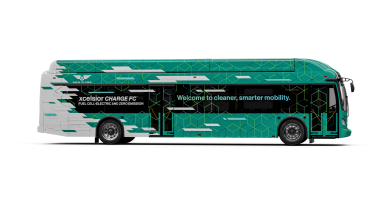Zero-emission transit: Mississauga launches innovative hydrogen-powered bus initiative
Mississauga is on track to acquire hydrogen fuel cell electric buses.
Environment | September 18, 2024
The City of Mississauga is set to become Ontario’s first municipality to pilot hydrogen fuel cell electric buses within its transit fleet. MiWay, Mississauga’s transit agency, is launching a Hydrogen Fuel Cell Electric Bus project to move towards more sustainable public transit. Backed by the Federal Zero Emission Transit Fund (ZETF), which granted approval for funding in December 2022, the City is on track to meet the project deadline of December 31, 2025, and is looking to purchase 10 hydrogen fuel cell electric buses.
In July, the City issued a Request for Information (RFI) for Hydrogen Fuel Supply Options, to secure a reliable hydrogen fuel supply. The “Hydrogen-as-a-Service” (HaaS) model aims to minimize operational risks by outsourcing hydrogen production, distribution, and dispensing infrastructure operations. There were nine submissions are under review from organizations interested in supplying hydrogen to the City. These proposals are currently under evaluation. The cost of hydrogen fuel will be requested and covered within the 2026 Operating Budget.
Sourcing and funding for the new buses
New Flyer Industries, from Winnipeg, is the only manufacturer in Canada that produces hydrogen fuel cell electric buses (FCEBs). A Council request has been made to ask for approval to source these buses from New Flyer, exclusively.
Around $20 million is being set aside to purchase 10, 40-foot hydrogen fuel cell electric buses. Up to $10 million is expected to be reimbursed through the ZETF, which covers 50 per cent of eligible project costs.
MiWay has requested an extra $500,000 to upgrade important facilities, including the Malton Transit and Central Parkway Body sites to support the new hydrogen buses.
Climate mitigation through MiWay’s transit fleet
If Council approves the initiative, it will support the City’s Climate Change Action Plan (CCAP), to reduce corporate greenhouse gas (GHG) emissions by 40 per cent by 2030, and 80 per cent by 2050. It will also showcase Mississauga’s dedication to reducing carbon emissions and furthering Mississauga’s role as a leader in sustainable transit solutions.
MiWay is Ontario’s third-largest municipal transit service provider. Nearly 60 per cent of MiWay’s buses are hybrid-electric. These buses resulted in a 30 per cent reduction in diesel fuel consumption per year and 5,134,000 kilograms (5,134 tonnes) of avoided GHG emissions per year.
Recently the City became an associate member of the Canadian Hydrogen Association. This a national, non-profit association that represents industry, academia, end-users and other stakeholders in Canada’s hydrogen sector. The City is also working to establish a hydrogen network (hub) that will bring together key players to promote and create a local hydrogen ecosystem (e.g. fuel, fuelling infrastructure, equipment, trucks and buses) to reduce GHG emissions reductions. The hub will also drive technological advancements, increase local jobs and grow the economy.
Hydrogen is a cleaner fuel option that offers a better alternative to diesel. Hydrogen-electric technology is one option that can work towards a zero-emission bus fleet. With Council’s approval, MiWay will become the first transit agency in Ontario to pilot this innovative hydrogen FCEB technology, setting the stage for transit fleet decarbonization and positioning itself as an industry leader.
The corporate report will go to Council next week, on September 25, for final approval.
Quotes
“If we’re going to be smart about climate change, we need to start looking into alternatives to diesel for our growing transit fleet and start investing to cleaner fuels and technologies. This $20 million investment will advance our understanding of hydrogen fuel and what it means for sustainable transportation options in the future. We’re committed to looking for innovative and low-emission solutions to reach our goal of reducing greenhouse gas emissions in Mississauga by 40 per cent by 2030.”
– Mayor Carolyn Parrish, City of Mississauga
“As a City, our goal is to look for innovative ways to lower corporate emissions, including our emissions from our transit fleet. We’re committed to investing in zero- and lower-emission vehicles and cleaner fuels, like hydrogen, which are becoming more available and include fuel cell technology for transportation. This decision to embrace hydrogen fuels shows Mississauga’s dedication to reducing its dependency on fossil fuels and its effort to become more environmentally friendly.”
– Geoff Wright, City Manager and Chief Administrative Officer, City of Mississauga
“MiWay is taking big steps towards transitioning to a zero-emission transit with major investments in our fleet. Since 2019, MiWay has been working to replace its diesel buses and bring lower emission vehicles in addition to now piloting and investing in new vehicle technologies like hydrogen fuel cell electric buses to meet the targets set out in the CCAP.”– Eve Wiggins, Director, Transit, City of Mississauga/MiWay

Tags
Media contact
City of Mississauga Media Relations
media@mississauga.ca
905-615-3200, ext. 5232
TTY: 905-896-5151



